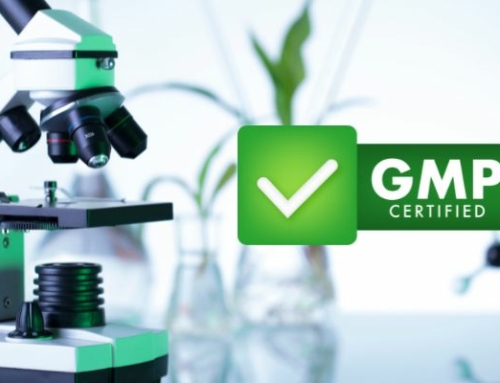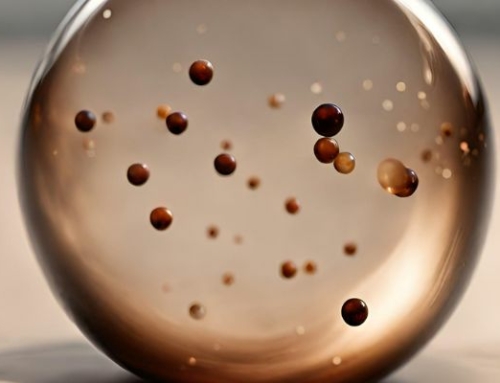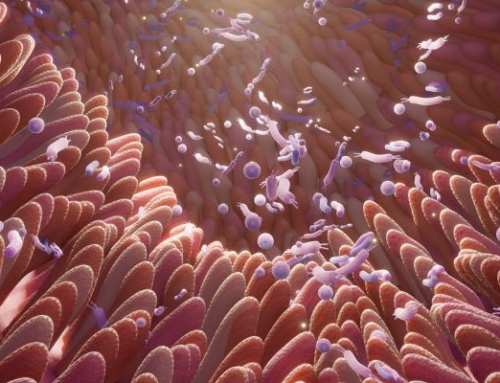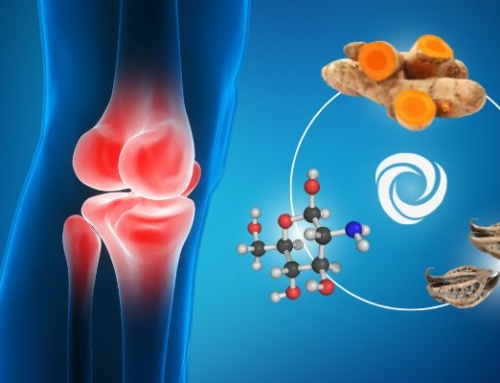B. Infantis,
the forgotten but essential probiotic strain
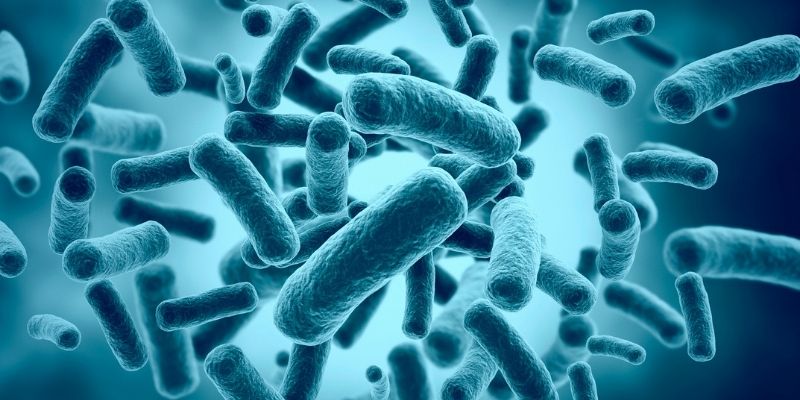
The microbiome plays an essential role in our immunity. We are born with a “capital” that is directly linked to the one of our mother, as our first exposure to external pathogens is in the womb, and colonization of the baby microbiome happens at birth soon as the water bag breaks, and natural delivery allows the baby to come in contact with the mother’s microbiome to seed its own. Children born through c-section may lack exposure to some beneficial microbiota strains (probiotics) which are essential support for digestive health and building strong immunity.
The Bifidobacterium infantis strain of bacteria is one of them. Like the Bifidobacterium Longum, it is a probiotic acquired naturally during childbirth and then with breastfeeding (1). This would explain the greater resistance to infection in breastfed children(2).
From the same family as Longum, its high nicotinic and folic acid content makes it specific. A theory called “hygiene hypothesis” (3) demonstrates that the increase, in many developed countries, of atopic allergic diseases (such as asthma, dermatitis or rhinitis) is due to the absence of an early exposure to Bifidobacterium Infantis.
Numerous scientific studies support this theory and have shown that breastfeeding and the environmental conditions in which babies are born and fed can influence the composition of their intestinal flora (4). This intake (or lack) of probiotics, including Bifidobacterium Infantis, can alter the initial regulation of the developing immune system and then influence the intestinal balance and digestive health of an individual throughout their life.
In addition, Bifidobacterium Infantis is particularly recommended for reducing symptoms of IBS – Irritable Bowel Syndrome – in women. According to a study sponsored by the P&G Health Sciences Institute and published in the American Journal of Gastroenterology, this strain is effective in relieving bloating, bowel problems and pain (5).
IBS – Irritable Bowel Syndrome – is accompanied by a significant reduction in the amount of intraluminal bifidobacteria, with consequences such as colic gas production and impaired motility of the intestinal tract.
The intake of probiotic complexes containing the Bifidobacterium Infantis strain allows to re-seed good bacteria and to act effectively without adversary effects to:
- Reduce IBS related pain. It has been demonstrated, that a combination of Bifidobacterium Infantis and Longum is associated with better control of intestinal pain and improvement of the quality of life children with IBS (compared to placebo) (6)
- “Bloating” reduction – Bloating is often categorized as the most intrusive IBS symptom and particularly difficult to treat (7),
- Regulate intestinal transit and bring overall relief to patients,
- Psychological benefits: Bifidobacterium Infantis is considered a “psychobiotic”, with anti-inflammatory actions and a real ability to reduce the activity of the hypothalamic-pituitary-adrenal axis which maintains the capacity of the organism to respond to acute and prolonged stressors. Results of large-scale placebo-controlled studies are expected (8).

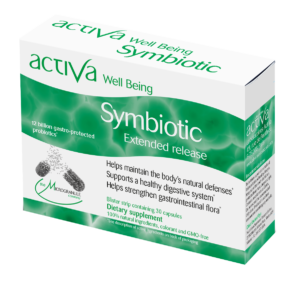 Laboratoires Activa Well Being Symbiotic is a unique complex of probiotics to improve immunity, digestive & intestinal health. The formula contains 4 strains for beneficial microbiota, including the Bifidobacterium Infantis as well as 3 prebiotics for healthy sustainability of the probiotics. It is developed using the microgranule technology offering 100% biocompatibility, bioavailability and gastroprotection essential to maintain the integrity of the living bacteria until their point of release in the gut.
Laboratoires Activa Well Being Symbiotic is a unique complex of probiotics to improve immunity, digestive & intestinal health. The formula contains 4 strains for beneficial microbiota, including the Bifidobacterium Infantis as well as 3 prebiotics for healthy sustainability of the probiotics. It is developed using the microgranule technology offering 100% biocompatibility, bioavailability and gastroprotection essential to maintain the integrity of the living bacteria until their point of release in the gut.
Discover Well Being Symbiotic here

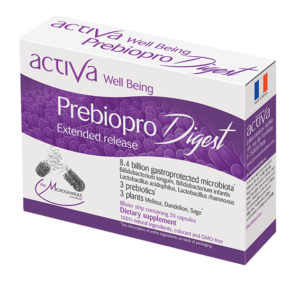
Laboratoires Activa Well Being PreBioPro Digest is a unique synergy of a symbiotic and plants for a depth action on the digestive comfort. The formula contains 4 strains of probiotics, 3 prebiotics and 3 plants for a complete action on the intestinal flora. It is developed using the microgranule technology offering 100% biocompatibility, bioavailability, and gastroprotection essential to maintain the integrity of the living bacteria until their point of release in the gut.
DISCOVER WELL BEING PREBIOPRO DIGEST HERE
Sources:
[1] Mark A. Underwood, J. Bruce German, Carlito B. Lebrilla, David A. Mills. Bifidobacterium longum subspecies infantis: champion colonizer of the infant gut. Pediatr Res. Author manuscript; available in PMC 2015 March 5. Study here
[2] Yoshioka H. et al., Development of the normal intestinal flora and its clinical significance in infants and children, Bifidobacteria and Microflora, 1991, 10(1): 11-17.
[3] Hypothèse de l’hygiène Professeur Pierre MASSON Institut Christian de Duve – Université Catholique de Louvain
[4] Sarah L. Young, Mary A. Simon, Margaret A. Baird, Gerald W. Tannock, Rodrigo Bibiloni, Kate Spencely, Juliette M. Lane, Penny Fitzharris, Julian Crane, Ian Town, Emmanuel Addo-Yobo, Clare S. Murray and Ashley Woodcock. Bifidobacterial Species Differentially Affect Expression of Cell Surface Markers and Cytokines of Dendritic Cells Harvested from Cord Blood. Clin Diagn Lab Immunol. 2004 Jul; 11(4): 686–690. doi: 10.1128/CDLI.11.4.686-690.2004. PMCID: PMC440611
[5] Whorwell PJ 1, Altringer L , Morel J , Bond Y , Charbonneau D , O’Mahony L , Kiely B , Shanahan F , Quigley EM . Efficacy of an encapsulated probiotic Bifidobacterium infantis 35624 in women with irritable bowel syndrome. Am J Gastroenterol. 2006 Jul;101(7):1581-90.
[6] https://www.ncbi.nlm.nih.gov/pubmed/27306945
[7] Nikfar 171
[8] https://www.ncbi.nlm.nih.gov/pubmed/23759244


